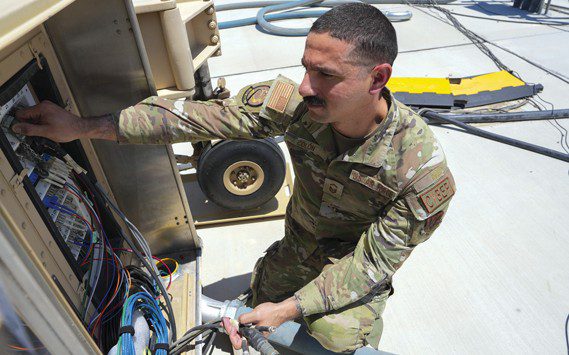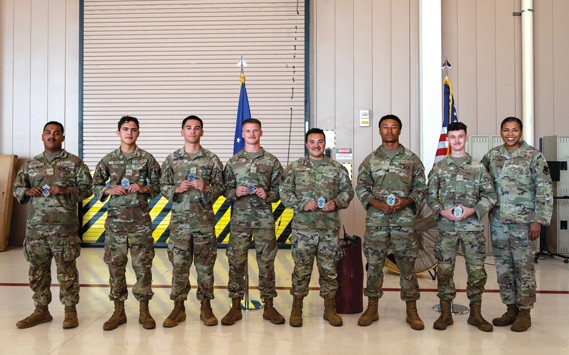With the U.S. Department of Veterans Affairs launching its improved community care program as part of the MISSION Act, enrolled veterans across the nation now have access to an expanded urgent care benefit, providing more options on when and where to receive timely care.
In Southern Nevada, this includes the addition of approximately 25 contracted in-network community clinics where eligible veterans will be able to access urgent care without prior authorization for treatment of non-emergent minor injuries and illnesses, such as colds, sore throats and minor skin infections.
Veterans can now use the following link to urgent care facilities in VA’s contracted network of community providers: https://vaurgentcarelocator.triwest.com/. To ensure local veterans are aware of their options, the VA has provided the following guidance regarding the expanded benefit:
Eligibility
VA can only pay for care under this benefit if a veteran is eligible and enrolled in VA health care and received care through VA (from either a VA or community provider) within 24 months prior to accessing urgent care.
Additionally, the services being provided must not be excluded under the benefit, and the provider must be part of VA’s contracted network of community providers and is identified as an urgent care provider. If an eligible veteran goes to an out-of-network urgent care provider, they may be required to pay the full cost of care.
Covered services
The urgent care benefit covers treatment of non-emergent symptoms such as flu-like symptoms (coughs and colds), wheezing, sprains, sore throats, painful urination, bumps and bruises, ear pain, and mild skin irritations, which are typically addressed by urgent care facilities and walk-in retail health clinics. Excluded from the benefit are preventive and dental services.
Additionally, emergency care is not covered by the expanded urgent care benefit. If a veteran has a medical emergency, or believes their life or health is in danger, they should call 911 or seek care at the nearest emergency room right away. Unlike an urgent need, a medical emergency is defined as an injury, illness or symptom so severe that a prudent layperson reasonable believes that delay in seeking immediate medical attention would be hazardous to life or health. Examples of a medical emergency include severe chest pains; seizures or loss of awareness; severe headache; heavy uncontrollable bleeding; poisoning; moderate to severe burns, and large broken bones. It is important to note that VA can only pay for care an eligible veteran receives from a community emergency department in certain circumstances and under specific conditions.
For more information, visit https://www.va.gov/communitycare/programs/veterans/emergency_care.asp.
Copayments
Eligible veterans may be charged a VA copayment for urgent care that is different from other VA medical copayments. VA copayments for urgent care depend on the eligible veteran’s assigned priority group and the number of times they visit an in-network urgent care provider in a calendar year.
• Priority Groups 1-5. There is no copayment for the first three visits during a calendar year. For the fourth visit and all subsequent visits in a calendar year, the copayment is $30.
• Priority Group 6. There is no copayment for the first three visits during a calendar year if the visit is related to special authority* or exposure. For the fourth visit and all subsequent visits in a calendar year, the copayment is $30. If the visit is not related to special authority or exposure, the copayment is $30 per visit, regardless of which visit it is.
• Priority Groups 7-8. The copayment is $30 per visit.
• Priority Groups 1-8. No copayment for a flu shot-only visit. Visits consisting only of a flu shot do not count as a visit for the number of visits in a calendar year for eligible veterans in priority groups 1-6.
• Special authorities include those related to combat service and exposures (e.g., Agent Orange, active duty at Camp Lejeune, ionizing radiation, Project Shipboard Hazard and Defense (SHAD/Project 112), Southwest Asia Conditions) as well as Military Sexual Trauma, and presumptions applicable to certain Veterans with psychosis and other mental illnesses.
For more information on VA enrollment priority groups, visit https://www.va.gov/healthbenefits/resources/publications/IB10-441_enrollment_priority_groups.pdf.
Prescription medication
VA will pay for or fill prescriptions for urgent care. For routine prescription medication, the prescription must be submitted to VA to be filled.
For urgent prescription medication of a 14-day or fewer supply, veterans will be able to either fill the prescription at one of more than 330 in-network contracted retail pharmacy sites located throughout Southern Nevada, or the prescription can be filled at a non-contracted pharmacy. If a non-contracted pharmacy is used, veterans must pay for the prescription and then file a claim for reimbursement with their local VA medical facility.
Some veterans may be required to make a copayment for medication. Information about copayments can be found at https://www.va.gov/COMMUNITYCARE/revenue_ops/copays.asp.
While urgent care is a convenient benefit for the treatment of non-emergent symptoms, veterans should always consider talking with or seeing their primary care provider if they are concerned that the community provider will not understand the complexities of their medical history or medications. Additionally, urgent care is not a replacement for an eligible veteran’s preventive health care. As such, eligible Veterans should also work with their primary care provider for this type of care. If an eligible veteran goes to an urgent care provider and receives services that are not covered by the urgent care benefit, they may be required to pay the full cost of care.












